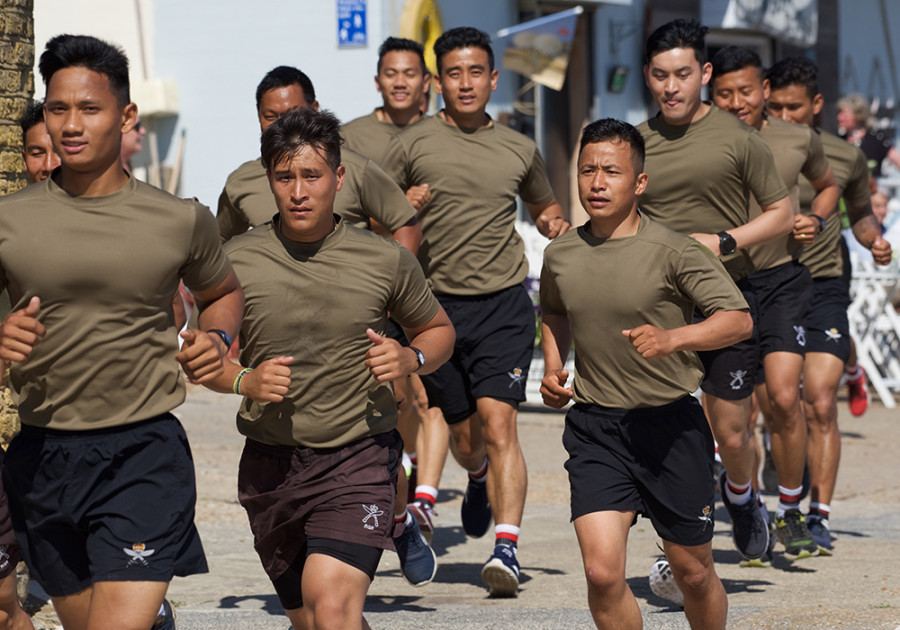National
Nepal officially proposes a review of the 1947 tripartite agreement with Britain on Gurkha soldiers
The agreement allows the recruitment of Gurkhas into the British and Indian armies but the government has long been asking for a review in the changed present context.
Anil Giri
The Ministry of Foreign Affairs on February 12 sent a letter to London, seeking a review of the tripartite agreement.
Nepal’s official request for a review comes months after Prime Minister KP Sharma Oli first raised the issue during his meeting in June last year with then British prime minister Theresa May in London. After the meeting between Oli and May, Foreign Minister Pradeep Gyawali had said that Nepal had proposed a review of the agreement, to which May had responded “positively”. A joint statement issued after the meeting, however, stopped short of mentioning that Oli had raised the issue.
Upon his arrival at Tribhuvan International Airport, Oli himself revealed that the UK did not accept the proposal.
The recent letter to the British government is a result of continued pressure on the Nepal government by Gurkha veterans who have served a March 15 deadline to form a joint talks team between the two nations as per the recommendations made by a joint technical team in 2018 on resolving the long-pending issue.
A senior official at the Prime Minister’s Office said that the letter was sent to the United Kingdom for their consideration as per the policy of the present government to scrap or review all discriminatory treaties and pacts signed with other countries and make them applicable to the changed context.
“We are following up on the matter in line with discussions held between the prime ministers of Nepal and Britain last year,” the official told the Post on condition of anonymity as he was not allowed to speak to the media. “We are equally concerned about the grievances of Gurkha veterans.”
The tripartite pact between Nepal, India and Britain assures that all perks, remuneration, facilities and pension schemes for Nepalis serving in the British and Indian armies will be equal to those of British and Indian nationals. However, Gurkha veterans have long alleged that Britain has put in place discriminatory policies in remuneration.
Just before Oli left for Europe last year, Gurkha veterans had demanded that he initiate talks with the British government as per the report of the joint technical committee and implement the report prepared last year by the parliamentary International Relations Committee.
While making a case for a revision, Oli last year had said the tripartite pact “is very old and does not serve our present needs”.
“We want to review it and make it a bilateral one,” said Oli at a press conference in Kathmandu on June 16 last year. “In this spirit, I proposed a review but the British side did not accept it.”
In the letter to the UK government, dispatched via the British Embassy in Kathmandu, the Ministry of Foreign Affairs has stated that Gurkha veterans have genuine grievances that require a generous response from the British side on the basis of equality, justice and fairness, according to a copy of the letter obtained by the Post.
“This matter, together with the need for a timely review of the tripartite agreement of 1947, was also discussed between the prime ministers of Nepal and the United Kingdom in London last year,” the letter reads. “The ministry recalls that the two prime ministers exchanged views on continuing discussions to address these matters.”
The letter to the British government is in line with a directive from the International Relations Committee of the federal parliament of Nepal.
In its report on March 15, 2019, the House committee had directed the government of Nepal to take up the tripartite agreement and the issue of Gurkha veterans with the British government on a priority basis.
The British government began providing equal salaries and pensions to Nepali nationals working in the British Army only from 2007.
“Nepal government thanks the British government for continued goodwill towards addressing the grievances. But some issues still remain unresolved,” reads the letter. “Various studies, including the Joint Report of the Technical Committee on Gurkha Veteran (2018) and the report of the UK Parliamentary Group on Gurkha led by Jackie Doyle-Price MP ( 2014), have outlined the progress made in this regard, while indicating that the outstanding grievances could be settled through bilateral discussions between the two governments.”
After the independence of India, the recruitment of Gurkha soldiers was organised by the way of the 1947 tripartite agreement between Nepal, India and Britain. The agreement also paved the way for the distribution between India and Britain of existing Gurkha brigades serving in British India. Thus, the 2nd, 6th, 7th and 10th Gurkha Rifles became part of the British Army after India gained independence while the rest were retained by independent India.
In the letter, the Ministry of Foreign Affairs has proposed official talks between the governments of Nepal and the United Kingdom.
“We would like to propose official talks with a view to reviewing the tripartite agreement and taking up the concerns pertaining to grievances of Gurkha veterans,” said the ministry. “The ministry would appreciate it if the British Embassy could coordinate with the concerned British authorities for their consideration on these matters and jointly working out details, including formation of teams on both sides.”
Krishna Bahadur Rai, chief coordinator of the Former British Gurkha Satyagraha Joint Struggle Committee, said that both sides should sit together for dialogue by forming a joint talks team.
“We hope that both sides will begin talks by March 15,” Rai told the Post.
The struggle committee has revised its deadline to March 15 from February 15.
“If both sides fail to form a joint talks team by the new deadline, we will be forced to launch yet another round of protests,” said Rai.




 10.12°C Kathmandu
10.12°C Kathmandu














